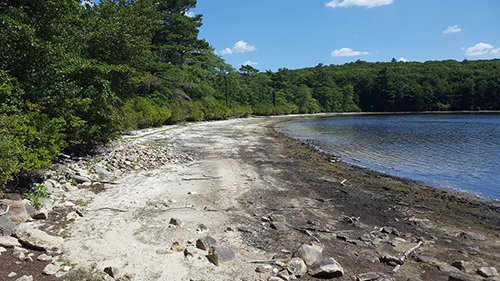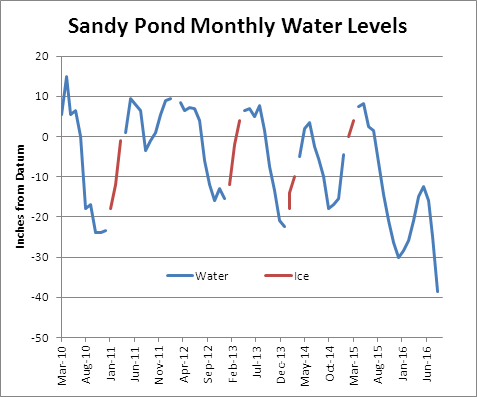The Lincoln Water Department has instituted a mandatory outdoor water ban that prohibits all lawn watering by means of automatic irrigation systems or manual sprinklers due to the worsening drought, which Monday morning’s storm did little to help.
The storm, which brought an EF-1 tornado to parts of Concord, dropped 0.55 inches of rain on Lincoln, according to Water Department Superintendent Greg Woods. Flint’s Pond, Lincoln’s primary public water source, is 55 inches below full capacity, “so even a full year’s worth of precipitation (typically 48 inches in Massachusetts) won’t bring us back to normal levels, even assuming we don’t withdraw any water as it’s filling,” he said.
The Water Department’s precipitation records show that the town is almost 7 inches below its median precipitation level for the last 40 years. Ground water levels have decreased 1.8 feet since May. As a result of the scarce rainfall, there’s been more demand for water for lawns and gardens; water use for June and July was 20 percent above 2015 and 30 percent above the five-year average, and current withdrawal rates are causing the pond level to drop one foot per month, Woods said.
On August 18, the U.S. Drought Monitor upgraded its drought assessment for most of Middlesex (including Lincoln) and Essex Counties to “extreme drought.” Several other area towns including Concord, Acton, Wayland and Sudbury have instituted watering bans similar to Lincoln’s, and 53 Massachusetts communities have restricted outdoor watering to one day a week or less.
Until the drought is over, Lincoln resident may not use underground or above-ground sprinklers or soaker hoses. They also may not fill or top swimming pools by more than two inches, or use games or toys such as water slides and sprinklers that use a continuous stream. Car washing is also prohibited.
Watering vegetable or flower gardens by means of a handheld hose is allowed from 6 p.m. to 9 a.m. only. Drip irrigation systems are also permitted for two days a week as determined by a resident’s street address (even-numbered houses may water on Tuesdays and Thursdays, while off-numbered houses may do so on Wednesdays and Fridays). Violators will receive a written warning for a first offense, a $50 fine for a second offense and a $100 fine for a third offense.
Although the ban covers only outdoor water use, the Water Department encourages everyone to conserve water inside their homes as well. Conservation measures include reducing shower frequency and duration, showering instead of taking baths, reducing toilet flushing, avoiding continuous running of faucets, and using the washing machine and dishwasher only when full.
Woods said he didn’t think a complete outdoor water ban had ever been imposed in Lincoln. The water level in Flint’s Pond was lower during the 1964-1966 drought and residents were asked to conserve water voluntarily, but lawn irrigation systems were not as prevalent as they are today, he noted.
There’s no immediate danger that Flint’s Pond will run dry. The pond is still at slightly more than 50% capacity and the Water Department has increased its use of its Tower Road well to help reduce the demand on the pond. However water levels in the well have dropped 1.8 feet since May, “so we need to watch that level as well so the well pump isn’t damaged,” Woods said.
The microfiltration plant on Sandy Pond Road that treats the water from Flint’s Pond can cope with the increased concentration of organic matter in the water, Woods said. The plant treats anywhere from 450,000 to 900,000 gallons a day before sending it to a 1.2-million-gallon holding tank at the top of the hill on Bedford Road. From there, the treated and filtered water flows through Lincoln’s 57 miles of water mains to residents’ faucets (see the Lincoln Squirrel, September 28, 2014).
The bigger concern is the uncertainty in the long-range forecast and whether this will be a multiyear drought. “We started this year about 20 inches below full capacity because 2015 was dry. If the pond level doesn’t recover this winter and spring, we could be in the same [watering ban] situation next year, but potentially earlier in the season than August,” Woods said.


Leave a Reply